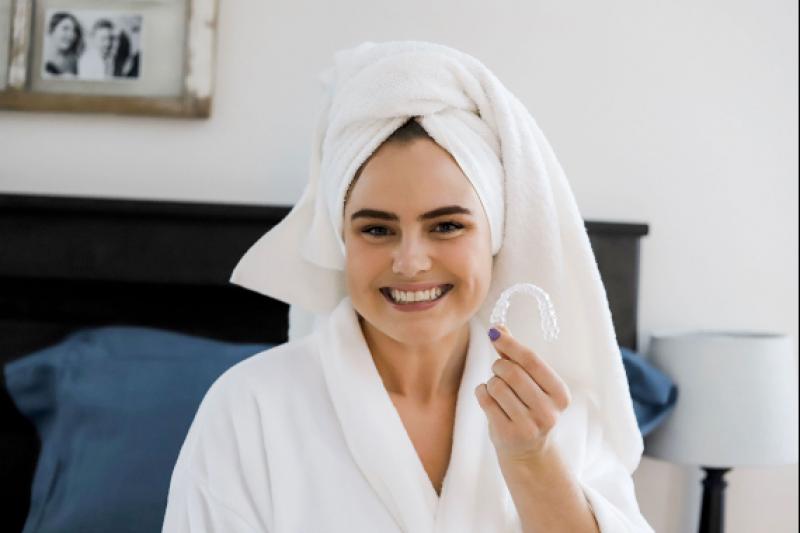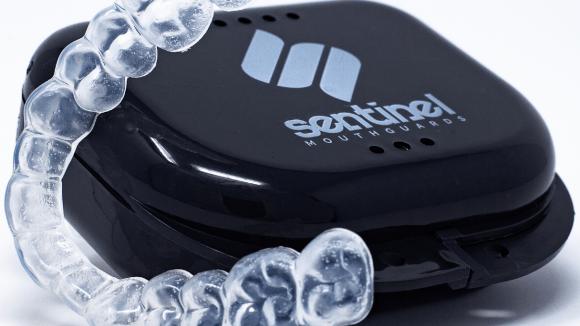Grinding Your Teeth? Why Wearing Your Dental Night Guard Matters
I don’t grind my teeth at night! I would know!
Many of us don’t realize we’re grinding our teeth until the dentist points it out. He/she can notice things in the mouth that we simply can’t see. For example, wear facets, flattened enamel, or notches in the sides of your teeth begin to show after years of teeth grinding and jaw clenching. These fractured and worn areas make the teeth more vulnerable to cracking and breakage.
Nighttime teeth grinding (bruxism) occurs while we’re sleeping (oftentimes in short, intense bursts). Because we’re asleep, we often don’t realize we’re doing it.
Wearing a night guard is an effective preventative tool that combats the physical effects of tooth wear. It does not stop grinding from taking place but rather prevents future damage to your teeth and dental work. Wearing a night guard can also offer relief if you’re suffering from jaw pain, muscle tension, headaches, or teeth sensitivity.
Consistency is key! Wearing a night guard on a consistent basis is the best way to prevent future damage from teeth clenching.

Why am I grinding my Teeth?
There are several reasons why people grind their teeth. It is not entirely known what causes bruxism, but it is thought to be due to factors such as stress, sleeping disorders, psychological factors, and certain types of medication.
What if I don’t wear my night guard and continue to grind my teeth?
Tooth enamel is extremely strong and dense. It may take months or years for side-effects of bruxism to develop. Watch for warning signs such as:
- Shorter, flattened teeth
- Increased tooth pain or sensitivity
- Jaw, neck or face pain
- Cracking, breaking, or loose teeth
- Broken dental work
- Ear pain
My night guard is uncomfortable. I can’t wear it.
Any dental night guard can take some time to get used to wearing. Sometimes all it takes is a little practice. Try wearing it longer each night, until you can sleep with it on the entire time. A hard night guard snaps into place like an orthodontic retainer and can feel a little tight at first.
Your dentist will check the fit of your new night guard before sending you home with it. It may take a week or two to get used to wearing. However, if you’re experiencing pain, tightness, or it feels like your night guard is pulling or shifting your teeth, contact your dental provider to have it adjusted.
Over the counter or stock night guards found in drug stores and department stores are mass produced and generally less comfortable than custom made night guards. A custom fitted night guard is created from a dental impression of your teeth. These designs are far superior to mass produced mouthguards in terms of quality, fit, durability and comfort.
I forget to wear my night guard at night. How can I remember to wear it nightly?
Turn it into a habit. Researchers say a habit takes up to 21 days to form. So, for three weeks, set your alarm to go off at bedtime. Right before bed, put your night guard in.
Many people claim that they get so used to wearing their night guard, they can’t sleep without it. Consistency is key.

What are some things I can do to stop grinding my teeth on my own?
- Avoid alcohol at least three hours before bedtime. Alcohol may intensify teeth grinding during sleep
- Cut back on or avoid caffeine after 3pm
- Use stress management techniques such as mindfulness or exercise
- Get a sleep study to rule out possible underlying conditions such as sleep apnea
- Meditate before going to bed at night
- Supplement with vitamin D, calcium and magnesium. Some studies report deficiencies in certain vitamins and minerals may contribute to teeth grinding
If you’re suffering from nightly teeth grinding and jaw clenching, wearing a dental night guard is the best way to combat the effects of tooth damage and costly dental repairs. Night guard fabrication ranges widely in terms of design and thickness. If you have trouble tolerating a mouth guard while you sleep, companies such as Sentinel Mouthguards, offer slim designed night guards and varying thickness options so that you can comfortably sleep with the oral appliance of your choice.
Author: Ashley Notarmaso, contributor
Medically reviewed by: Sharon Boyd, MA RDH
Sharon Boyd, MA, RDH, has over 20 years of experience in the dental industry and is the founder of DentaSpeak, LLC. In addition to being a registered hygienist, she also holds a master’s degree in Strategic Communication and a degree in Human Relations and Business. Sharon serves as a full-time patient education professional with special interests in dental communications methodology. She often works as a liaison between practitioners and patients, bridging the gap between care needs and patient concerns. Sharon is an Ironman, band mom, and enjoys teaching Sunday School at her family’s church.
More to Read:
Previous Posts:





